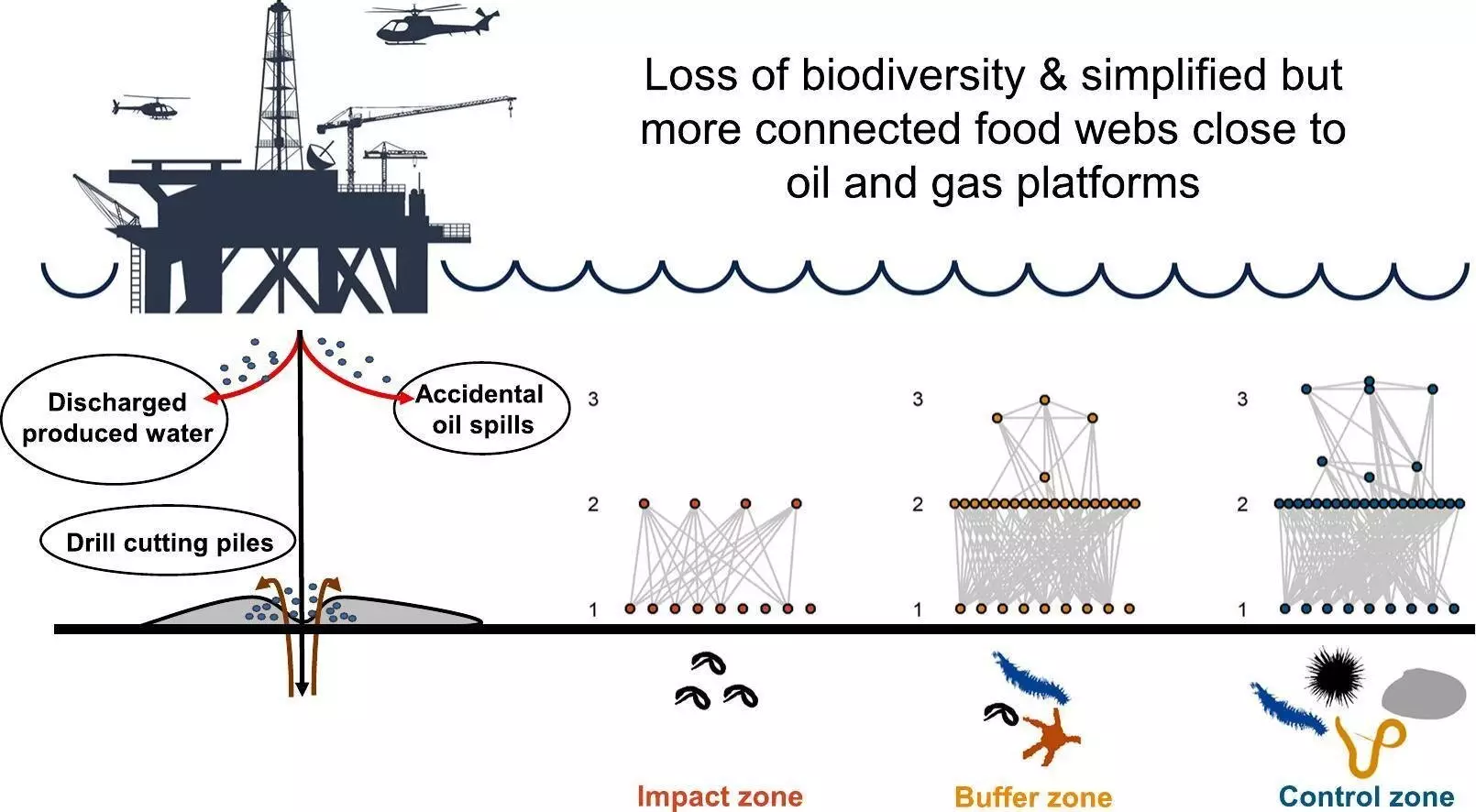The extraction of oil and gas from the North Sea has long been a contentious issue, with a recent study revealing startling truths about the environmental consequences of this practice. Conducted by a collaborative group of researchers from the University of Essex, the Natural History Museum, and the Center for Environment, Fisheries and Aquaculture Science (CEFAS), the research unveils the staggering spike in pollution and subsequent biodiversity loss surrounding offshore platforms. According to their findings, populations of marine species near drilling sites have plummeted by nearly 30%, offering a sobering view of the ecological costs associated with fossil fuel production.
The investigation, documented in the journal *Science of The Total Environment*, unearthed that pollutants such as hydrocarbons reach levels more than 10,000% higher within just half a kilometer from these oil platforms, compared to unperturbed sites further afield. Heavy metal contamination mirrors this trend, with elements like lead and nickel spiking by about 455%. This data isn’t merely a snapshot; it reflects decades of accumulating pollutants that are now palpably impacting marine life. The integrity of the seabed ecosystem is at stake, raising urgent questions about the sustainability and responsibility of continuing fossil fuel exploration.
The Ripple Effect on Marine Ecosystems
Marine ecosystems depend on a delicate balance, and the research highlights how oil platforms disrupt this equilibrium. The study’s comprehensive analysis of 4,216 species collected over a thirty-one-year span reveals a concerning simplification of food webs in contaminated areas. As larger predators, such as starfish, dwindle near these sites, smaller organisms—generally more resilient to adverse conditions—begin to dominate. Although it might seem favorable for these smaller species to thrive, their predominance is indicative of an unhealthy ecosystem, which becomes increasingly less productive and diverse under pressure.
This ecological imbalance poses far-reaching consequences: as marine invertebrates decline, so too does the food available for larger fish and mammals. The implications stretch beyond marine biodiversity and threaten the broad spectrum of life that relies on healthy oceans for sustenance. The study illustrates how fossil fuel extraction not only harms immediate marine life but essentially reaches up the food chain, disrupting entire ecosystems.
Scientific Insights from Long-Term Research
The validity of the study is further enhanced by its rigorous methodology, examining both pre- and post-production biological samples at various distances from the oil platforms. Led by Ph.D. candidate Zelin Chen, the research team demonstrated a significant decrease in species richness within 500 meters of the oil rigs, with Dr. Eoin O’Gorman commenting on the importance of these findings. He notes that the result—a simpler food web—serves as a clear indicator of an ecosystem under stress.
Moreover, the research highlights a crucial aspect often overlooked: the long-term legacy these platforms impose on marine environments. As many of them approach the end of their operational life, the urgency to address decommissioning practices becomes paramount. Without a science-led approach that prioritizes ecological health, we risk leaving behind a severely damaged ocean landscape.
The Call for Collaborative Action
The findings of this study serve as a rallying cry for collaboration among industry, government, and the scientific community. Dr. Natalie Hicks emphasizes the need for strategic decommissioning efforts that focus on fostering recovery and safeguarding the oceans for future generations. If left unchecked, the destructive legacy of fossil fuel extraction will echo for decades, presenting a challenge not just for marine life, but also for humanity’s environmental stewardship.
As the specter of climate change looms ever larger, our approach to fossil fuels must evolve. The ocean is a critical ally in this battle, providing ecosystem services that can help mitigate the impact of climate change. The insights gleaned from these research findings underscore the pressing need for sustainable practices that benefit both our oceans and the myriad organisms that inhabit them.
Reassessing Our Relationship with Natural Resources
This study invites us to reevaluate our ongoing reliance on fossil fuels and consider alternative energy pathways that do not inflict irrevocable harm on our environment. A future with sustainable energy sources is not merely a dream; it is a necessity if we are to honor our responsibility towards the planet. The health of our oceans cannot be an afterthought, as the intricate web of life they support is integral to the planet’s overall ecological balance.
In light of this evidence, the conversation surrounding fossil fuel extraction must shift—from mere economic assessment to one encompassing ecological impacts and sustainability. The undeniable link between human industry and marine health calls for immediate, informed action. The stakes are high, and the time to act is now. Our future—and the future of our oceans—depends on it.

